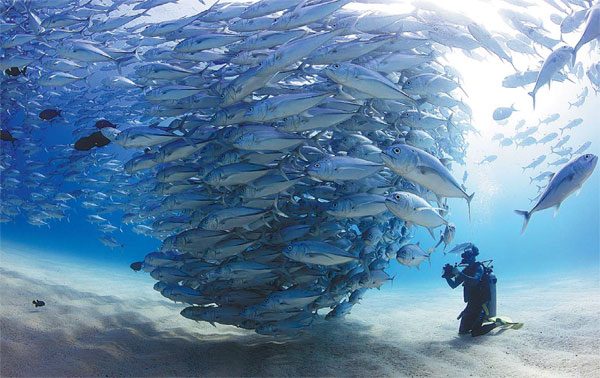 |
|
US marine biologist and oceanographer Sylvia Earle dives with a group of jack fish during an expedition. [Photos provided to China Daily] |
Scroll down through the items on the Outcome List of President Xi Jinping's recent state visit to the United States, and right down at the bottom, after all the blurb on the two sides strengthening their practical cooperation in promoting a strong and open global economy, and their affirmations they will work together on various issues, you will come, at last, to item No 49.
This, the final item on the list, states the two countries decided to continue to enhance their communication and coordination in maritime and fishery affairs and step up dialogue on ocean protection. This will include a partnership between the coastal cities of Xiamen and Weihai in China and San Francisco and New York in the US to share best practices to reduce the flow of trash into the ocean.
Well hurrah!
Not to put too fine a point on it, the oceans are mess. In fact, we're killing them; smothering them with trash - mostly plastic - and poisoning them with toxins and sewage.
Scientists from the nonprofit advocacy group 5 Gyres collected plastic from parts of the ocean with nets and then used computer models to estimate the extent of the garbage problem worldwide. They estimate there are 5.25 trillion pieces of plastic debris in the ocean, most of which is micro-plastic.
While it is the islands of trash formed by the concentrating of flotsam by the ocean gyres that grab the headlines, they conclude there are also around 4 billion plastic microfibers per square kilometer littering the deep sea as a result of floating plastic trash breaking up. It has also been predicted the amount of trash in the world's seas will rise every year for the rest of the century.
And this is only one of the man-made threats to the health of the world's oceans. Greenhouse gases, overfishing and localized pollution, also threaten the ocean food chains, which scientists warn are at risk of collapse.
Most ocean pollution originates from industry, agriculture or other sources on land. This is either directly dumped into the sea or else carried there by rivers and the air. Heavy metals, pesticides and persistent organic pollutants all end up in the ocean, where they have devastating effects on marine life. As does the release of sewage into coastal ecosystems, which increases the microbial activity that depletes the oxygen in the water, creating dead zones.
Meanwhile, a massive underwater heatwave, driven by climate change in recent years, is killing off the coral reefs that nurture 25 percent of the world's marine species.
It has been suggested in the British press that a proposed turbot and crab starter has been replaced on the menu for the welcome lunch at Buckingham Palace during Xi's state visit to the United Kingdom next week; because Xi and his wife will only consume cured or smoked fish.
It would be nice to think that the agreement with the US comes from his personal understanding of how sick the seas are and that cleaning up the oceans is something of a personal crusade. But even if the agreement with the US is just to help the two countries' fishing industries, greater attention to the health of the world's oceans is to be welcomed.
The author is a senior editor with China Daily. [email protected]

I’ve lived in China for quite a considerable time including my graduate school years, travelled and worked in a few cities and still choose my destination taking into consideration the density of smog or PM2.5 particulate matter in the region.